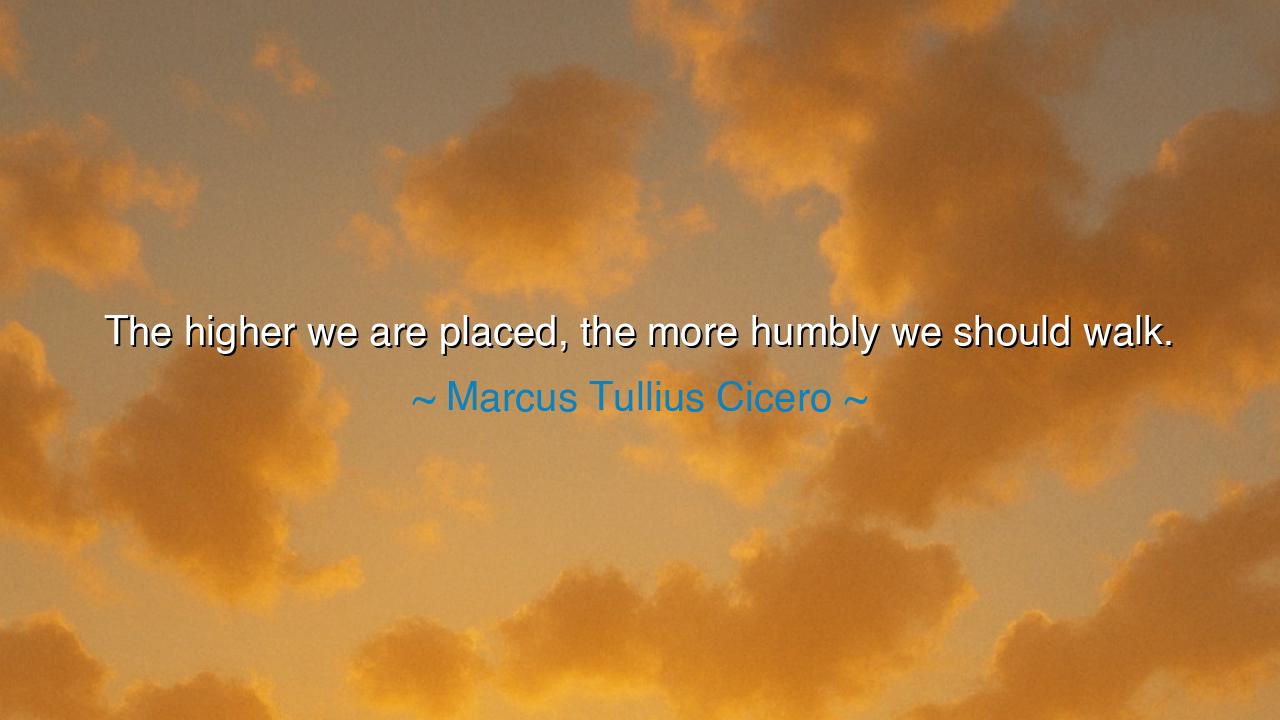
The higher we are placed, the more humbly we should walk.






The words of Marcus Tullius Cicero, “The higher we are placed, the more humbly we should walk,” shine with the stern wisdom of Rome. He teaches that power and honor are not crowns to inflate pride, but burdens to be carried with gentleness and care. The man who rises above others in station must not exalt himself over them, for the weight of his position is given not for vanity, but for service. To walk humbly while holding high rank is the true mark of greatness.
The ancients long feared the poison of arrogance. They knew that fortune lifts men swiftly, but pride casts them down swifter still. The Greeks told of Icarus, who soared too near the sun, forgetting his humility, and fell into the sea. Rome itself fell into ruin when its rulers abandoned Cicero’s warning, trading moderation for tyranny, and duty for indulgence. Thus, humility is not weakness but the safeguard of those set high, the anchor that keeps them from destruction.
History bears clear witness. Consider George Washington, who at the end of the American Revolution might have made himself king. The army adored him, the people trusted him, and power lay within his grasp. Yet he laid it down and returned to private life, walking with the humility Cicero praised. In that act he became not less, but more: his refusal of absolute power established a republic and gave him a greatness surpassing conquest. His life shows that true authority is magnified by restraint.
Cicero himself lived in a Rome where leaders often forgot this principle. He saw generals who, intoxicated by victory, turned their armies against their own people. He saw senators blinded by greed, claiming privilege without service. From such corruption came civil war and the death of the republic. Thus, his words were not idle philosophy, but a warning born of bitter experience—that the loftier the perch, the more vital the humility.
Let the generations remember: pride is the downfall of rulers, but humility is their crown. The higher one is placed, the greater the temptation to arrogance, and the greater the need for moderation. To walk humbly when raised high is to remind the people that power is service, not mastery. For in truth, the greatest leader is not the one who towers above his people, but the one who bends low to lift them up.






TTPham Thi Thanh Thao
Say I’ve just been promoted. What should week one look like if I want to lead with restraint and curiosity? I’m picturing a listening tour focused on three questions: What’s working, what’s grinding people down, where am I likely to miss context? I’d also publish decision principles and a clear “stop me” protocol so teammates can flag blind spots without drama. What pitfalls should I anticipate—overpromising, analysis paralysis, favoritism—and what rituals keep me honest over time?
TTTuan Thanh
There’s a difference between humility, false modesty, and low self-worth. The first acknowledges limits while staying accountable; the second is image management; the third can avoid responsibility altogether. How do you keep the virtue from collapsing into either performative coyness or self-erasure? Are there phrasing habits that help—owning decisions plainly, naming trade-offs, inviting critique without outsourcing the call? I’d appreciate examples of language and behaviors that balance confidence with teachability, especially under spotlight pressure.
THNguyen Thanh Huyen
For people in public service, the optics and the substance both matter. Listening tours and open office hours look respectful, but do they change policy choices or just shape headlines? What commitments would make deference to constituents real—publishing meeting notes with lobbyists, setting response-time SLAs for casework, or reversing course when new evidence emerges? I also worry about tokenizing humility: ritual self-effacement that leaves patronage intact. How do we link modest demeanor to redistributive outcomes?
NTNguyen Tung
In organizations, humility should be auditable. What metrics actually capture it? Meeting talk-time ratios for executives, the percentage of promotions sourced from stretch opportunities, or how often senior folks change course after frontline input? Maybe even a “credit-to-blame” ratio: leaders name contributors publicly but absorb responsibility privately. What mechanisms institutionalize those norms—skip-level roundtables, rotating agenda owners, or transparent decision logs? I’m curious which interventions measurably reduce fear and increase psychological safety without slowing execution.
QTQuan Tran
Power can warp perception; empathy seems to shrink unless it’s actively trained. What daily habits protect perspective once you’re elevated—structured listening blocks, regular “ground truth” visits, or a standing rule to speak last? I wonder how to create a personal feedback loop that bites: anonymous pulse surveys, 360s with teeth, or a trusted skeptic who can veto presentations of self? Also, how do you spot false humility—the kind that deflects praise while still centralizing control?